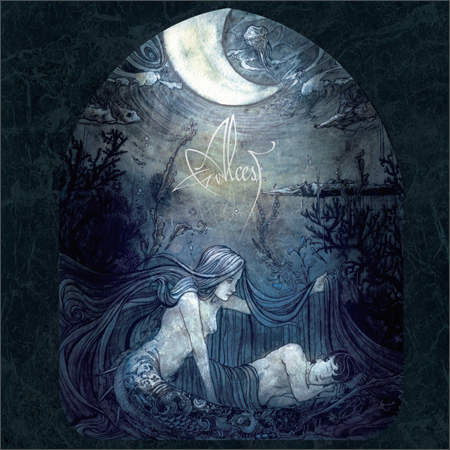When Alcest started up back in 2005, they were yet another straightforward black metal ‘band’ (actually a one-man studio project by mysterious Frenchman Neige). Sure, they had quieter passages, but they felt more-tacked on than ingrained. Then debut album Les Souvenirs d’un Autre Monde came out in 2007, and they were yet another black metal band crossing over into something else, in a seemingly endless line of ‘experimental’ acts who were doing all sorts of weird things to black metal. But that album was special, unique; its forays into plaintive shoegaze and gorgeous clean vocals were not merely a metal act selling out, but one brashly embracing its diverse influences (despite what the man himself may have to say about this) instead of kvlt posturing. The album was massive and critically well-received, and really it was too polished, taking the quieter passages of early release La Secret and making an album of them, losing sight of the whole metal thing in the process. On the other hand, Neige side project Amesoeurs proved rather awkward with its careless mash of more traditionally metal passages and poppier, prettier fare, an interesting experiment but no lasting statement.
Three years later the second Alcest LP Écailles de Lune is finally upon us, and it seems like Neige has spent those years finding the perfect balance between metal and flesh. Once again the album is presented as a series of long tracks, each one containing several movements but distinctly linked to each other. There’s no overwrought symphonic ambition, no desperate stitching-together of dissimilar ideas: these nine-minute songs sound carefully written and methodically conceived. The title track opens the album in two parts, the first a post-metal (sorry) shoegaze epic with an unforgettable melody, cyclic clean-guitar riffs, and even a sunny, upbeat interlude. Just when it seems like things are continuing in typical Alcest fashion, the clean guitar morphs into frantic black metal, steamrolling sheets of guitar and primitive pounding drums, pinned down by that same haunting melody: this is the point where all the identities of Alcest converge into something nearly miraculous. The second part picks up where the first left off, decked out in all-black before melting back into the watery, chorus guitar for some more plaintive siren songs.
Admittedly, these straight-up black metal passages are few-and-far-between but even if Neige rarely indulges himself, it’s for the better. He sows the black metal deep enough where it’s noticeable but not intrusive (unlike the debut where it was so deep it was almost impossible to detect), and when it does emerge, it’s glorious, the darkness taking over like a solar eclipse. “Percées De Lumière” shoves a more traditional, melodic backing underneath the black metal vocals, revealing layers of complex emotion that the genre so often lacks, sounding like a God-forsaken soul howling at the moon as powerfully as he can and ripping his throat to shreds. The most gorgeous, heart-wrenching moments are saved for the closer, an exercise in delaying release as far as humanly possible: the eight minute entirety is just a clean guitar and Neige’s vocals, but it’s as enthralling as any of the metal chest-beating.
Écailles de Lune is the kind of music that sounds viscerally exciting as you listen, so confident in its intergenre dialogue. He’s not a washed-up black metal musician or a maudlin hack desperately looking for some indie cred (something which Souvenirs felt like sometimes), and the LP is carefully balanced but not overwrought. In abandoning the soppy overtures of Souvenirs, Neige makes an even better case for himself as a pioneer, and his new explicitly-black mode is far more appealing than the old. Even when he does the old schtick it still sounds better, as on “Solar Song” which is essentially a Souvenirs pastiche, the Brit shoegaze influences overpowering everything else in grand fashion. Let me just put it this way: I’m not someone who usually tolerates overt ‘emotion’ in extreme metal, but with Alcest, it just feels real, and in 2010, not much feels real or honest anymore.

